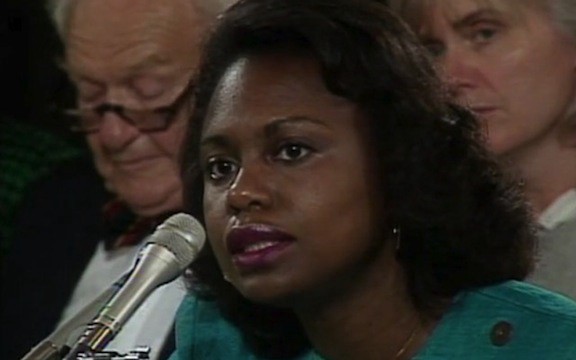“Once I got subpoena’d, I knew what I had to do. I’m gonna tell what happened to me.”
Directed by Oscar nominee Freida Mock, Anita focuses on the Clarence Thomas hearings, particularly the injustice of how her appearance in front of Congress as a witness to Thomas’ sexually inappropriate behavior at the office became a trial of her character, simply because she chose to speak an inconvenient truth. In the film, Hill recalls that she received “bomb threats [as well as those of] sexual violence” — sadly, instances of all-too-familiar acts of harassment that continue to plague virtually any and all women who speak out against powerful men and male privilege.
The film also situates Hill’s historic and legal importance in terms of the then-controversial issue of sexual harassment at the workplace. One interviewee locates precisely why Congress and the conservative media’s demonization of Hill was so galling to feminists (and anyone with a brain): “To any victim of sexual harassment, the message is nobody’s gonna take you seriously, not even the United States Senate.”
Melissa Silverstein saw the documentary at last year’s Sundance festival and wrote a review, a part of which is excerpted here:
When I was a young woman just starting in my career I encountered sexual harassment like so many other women. I had no idea how to handle it and really didn’t know what it was. It scared me and made me miserable. Then one day I watched this woman, Anita Hill, sit before an all white, male Senate committee and talk about what a potential nominee for the Supreme Court had done to her, and it hit me deep. Her guts, her composure and her honesty changed me. She empowered me and many other women to stand up for ourselves. I put on my “I Believe Anita Hill” pin and did not look back.
Now, a little over twenty years later Academy Award-winning director Freida Mock reintroduces us to Anita Hill and reminds us of the debt we owe to her. It is amazing to go back to that time to see this woman, this reluctant witness, endure hours upon hours of testimony on what her experiences were when she worked for Clarence Thomas at the EEOC. This was a woman who did not want to testify but she believed it was her duty to do what she did. In the film you see her arrive in DC from Oklahoma for her appearance looking like a deer in the headlights, still not really knowing what was going to happen to her. Watching that moment, seeing her fear, made my heart skip a beat.
The crazy thing is that she was probably the worst person the Senate could have called because she actually knew what sexual harassment was. She was a trained lawyer on these issues, worked at the EEOC, and knew how to handle being grilled by hostile parties. She schooled the committee on sexual harassment, and in her contemporary interviews she relays her own shock as to how unprepared the committee members were in dealing with the issue.
Watch the Anita trailer below:
Previously: “Interview with Freida Mock, Director of Anita”







